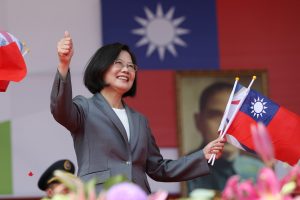At the 2020 Yushan Forum, Taiwan’s President Tsai Ing-wen highlighted the significance of the New Southbound Policy and reiterated the spirit of “Taiwan helps Asia, and Asia helps Taiwan,” a slogan Tsai has promoted on several occasions. She also pointed to Southeast Asia and India as particular focus points for the policy.
“The New Southbound Policy is Taiwan’s regional strategy for Asia. Its goals and ideals coincide with those of the Association of Southeast Asian Nations (ASEAN) Outlook on the Indo-Pacific and India’s Act East Policy,” Tsai said. “Working together, these initiatives can achieve mutual benefits with complementary economic and social successes.”
This is not the first time that Taiwan has attempted to increase its international outreach. Previous administrations under Lee Teng-hui and Chen Shui-bian were also invested in Asia. Under Tsai, however, the geographical scope and areas of cooperation have been expanded. Since 2016, along with the 10 ASEAN member states, Australia, and New Zealand, Taiwan is also attempting to strengthen ties with six South Asian countries: Bangladesh, Bhutan, India, Nepal, Pakistan, and Sri Lanka.
Last year, Taiwan’s image was given a much-needed fillip among Asian countries, specifically India. Taiwan’s impeccable response to COVID-19 facilitated its regional outreach, and 2020 displayed encouraging trends for Taiwan to further engage fellow Asian countries.
If countries learn just one lesson from the pandemic, it should be that cooperation should not be limited to the traditional areas of security and commerce. Engaging Taiwan by consolidating cooperation in areas such as health under the framework of the New Southbound Policy is immensely important. However, before cooperation under the New Southbound Policy intensifies, it is important for the Tsai administration to take stock of the policy and further bolster its efforts for long-term results.
The New Southbound Policy has accrued benefits for Taiwan, but given the potential of the policy, much could be done to strengthen it further. There are a few issues holding progress back. For decades, much of the focus of Taiwan’s foreign policy agenda has been America-centric and Asia still does not figure as much as the United States and Europe do. In addition, the absence of diplomatic ties between Taiwan and the countries under the New Southbound Policy and lack of reciprocity might be dissuading factors for Taiwan to devise a consistent policy toward the countries of the region. Finally, a lack of expertise on the South Asian countries in Taiwan is a major hindrance.
Despite the New Southbound policy being an important part of the government agenda, a long-term framework to engage the countries under the policy is yet to be formulated. While the Tsai administration has been active in acknowledging the importance of diversifying partnership with Asian countries, it needs to do more in expanding areas of cooperation. Economic relations are moving ahead, but aspects such as cultural and people-to-people exchanges still lag behind. To address the gaps in the New Southbound Policy, it is crucial to cultivate people-to-people ties. One way is to attract the younger generation from the New Southbound countries to Taiwan. The importance of generating more familiarity about Taiwan among students and professionals from the New Southbound countries cannot be emphasized enough.
Let us take the example of India, one of the most important New Southbound countries. Most Indian students and professionals in Taiwan are in the sciences or engaged in the corporate sector. In fact, several Taiwanese universities have a Memorandum of Understanding with the Indian Institute of Technology (IIT) for research collaboration and promoting student and faculty exchanges in the sciences. While it is crucial to encourage students and professionals from different fields to study and work in Taiwan, a focus on attracting students and researchers from the social sciences will prove beneficial in expanding Taiwan’s political capital. While fellowships such as the Ministry of Foreign Affairs’ Taiwan Fellowship and Ministry of Education’s Huayu Enrichment Language Scholarship exist, lack of awareness about the same among students and professionals in India (and elsewhere) is still a problem. It is important for the administration to realize that investing in social sciences is equally important and will bear fruits in the long term for Taiwan. It is even more important is to cultivate home-grown and foreign scholars who consistently focus and develop expertise on Taiwan.
Another problem is the lack of interaction and collaboration among the strategic communities in Taiwan and the New Southbound countries. Recently, the Taipei-based think-tank Taiwan Asia Forum Exchange (TAEF) signed an MoU with the New Delhi-based National Maritime Foundation (NMF). That was a welcome step and more such collaboration is needed among Taiwanese and New Southbound countries’ think-tanks.
It is also important to highlight that while the previous iterations of the Go South Policy did motivate Taiwanese scholars to focus on Southeast Asia, expertise and deep understanding of South Asia is still deficient in Taiwan. Given Taiwan’s keen interest in the Indo-Pacific and India’s role as a central component of the Indo-Pacific, cultivating area studies on the Indian subcontinent will bolster the New Southbound Policy further.
The New Southbound Policy is categorized as a people-centered policy and a consistent focus on this effort will be beneficial for Taiwan. In this context, launching a New Southbound Policy blueprint articulating Taiwan’s explicit interests vis-à-vis different countries will help boost the policy, and make it easier for the New Southbound countries to identify mutual areas of interests.
The New Southbound Policy has immense potential to significantly increase Taiwan’s regional outreach in the countries that were not traditionally part of Taiwan’s strategic thinking, and may very well serve as an answer to China’s attempts to shrink Taiwan’s international space.
Sana Hashmi is a visiting fellow at the Institute of International Relations, National Chengchi University, Taiwan, and the author of “China’s Approach Towards Territorial Disputes: Lessons and Prospects.” She tweets @sanahashmi1.

































